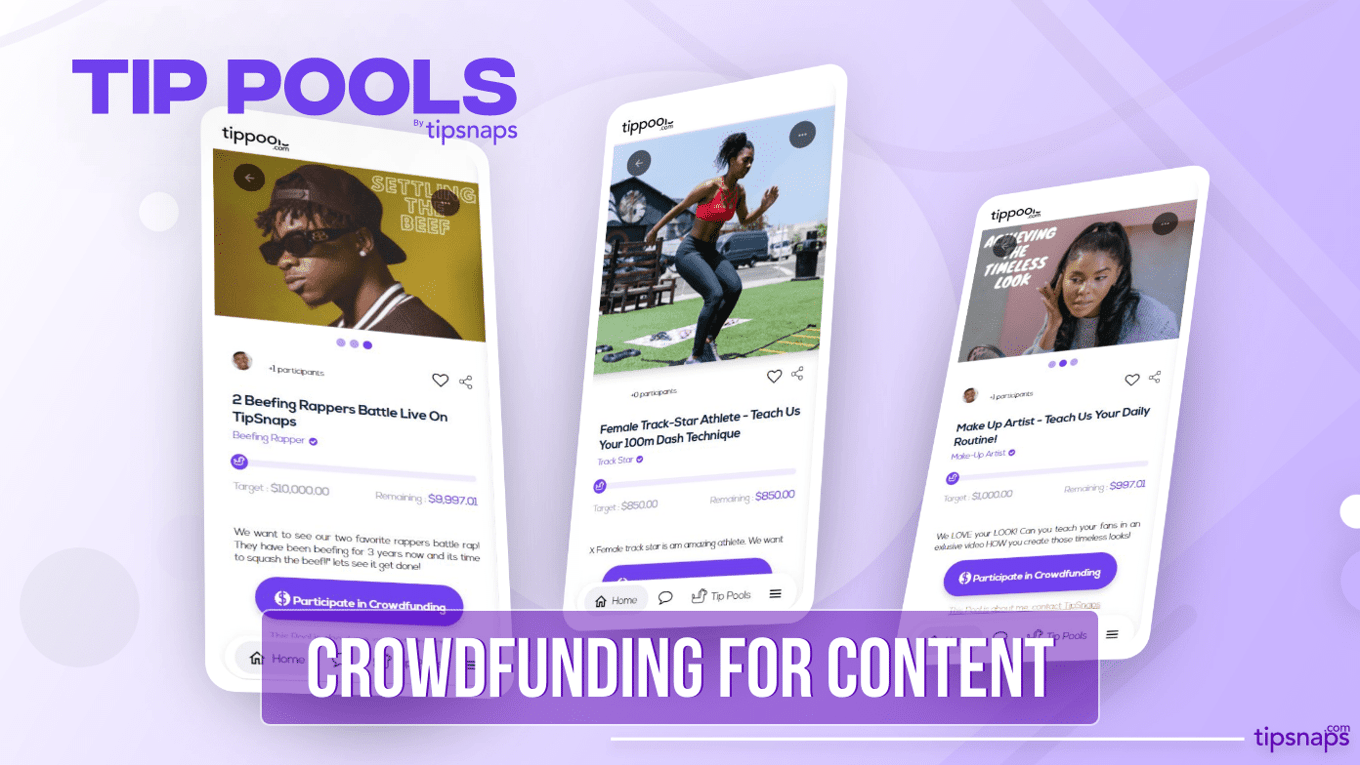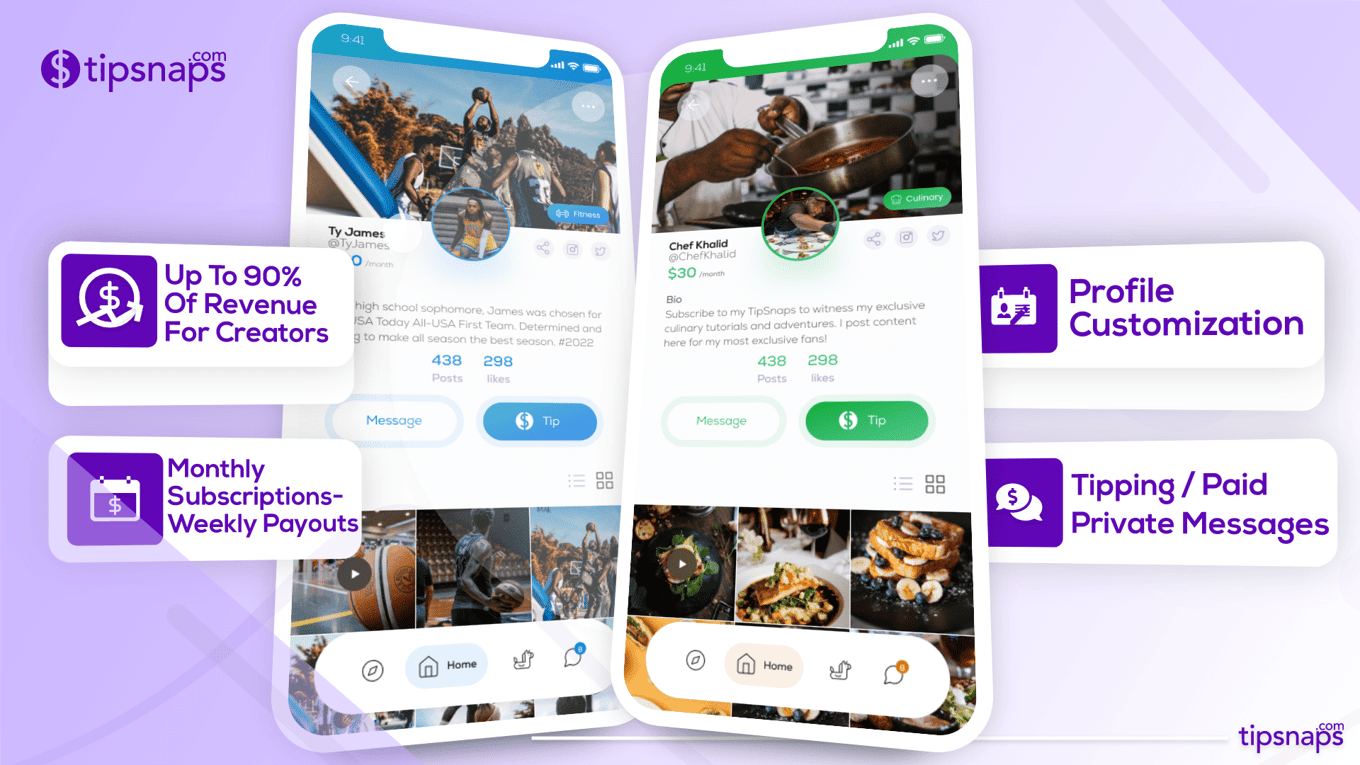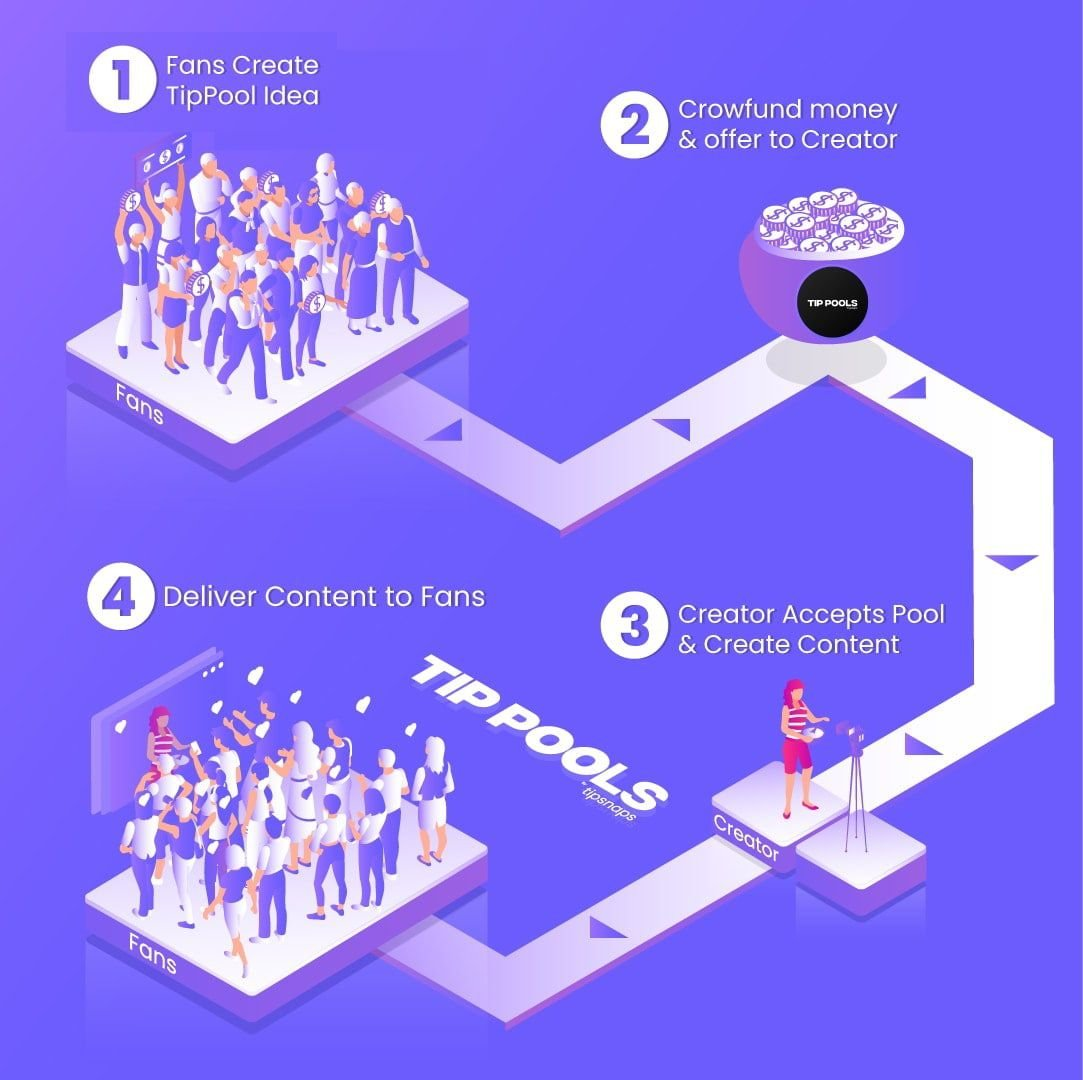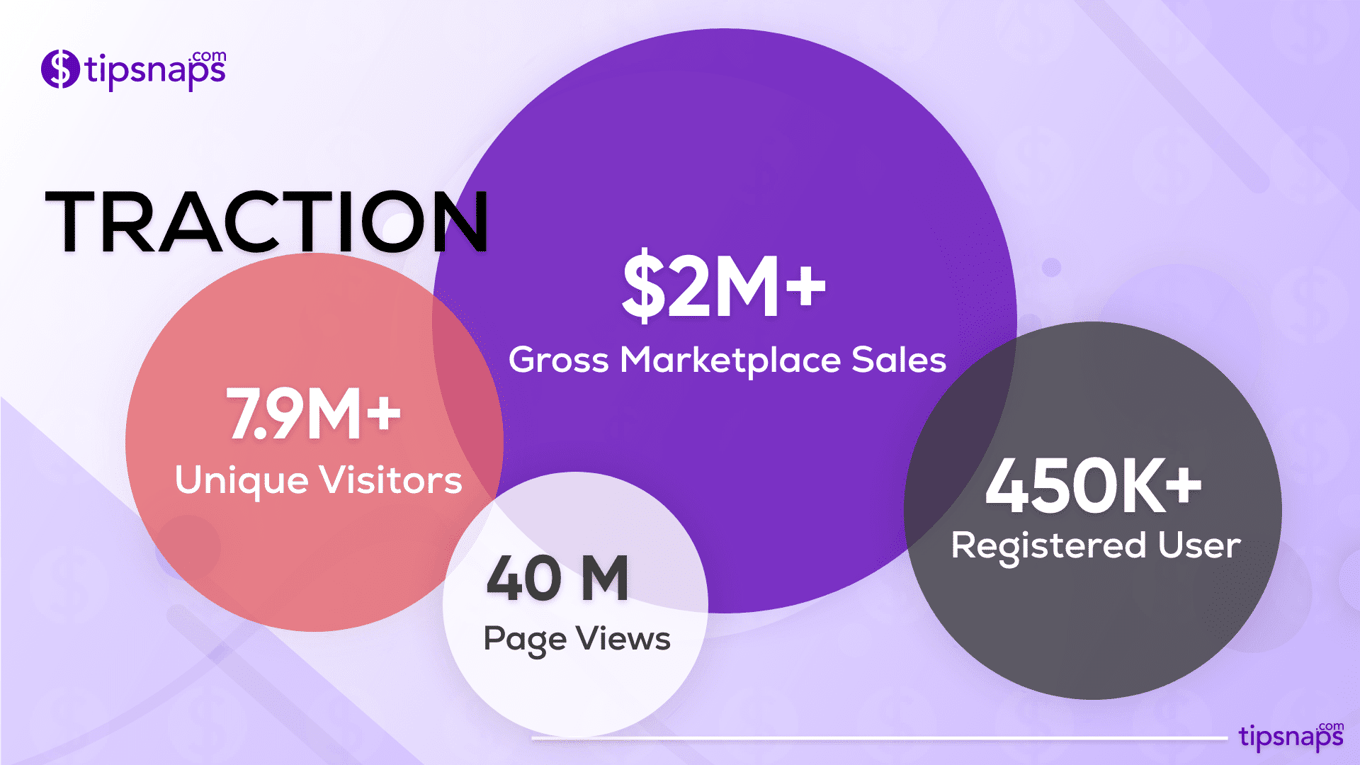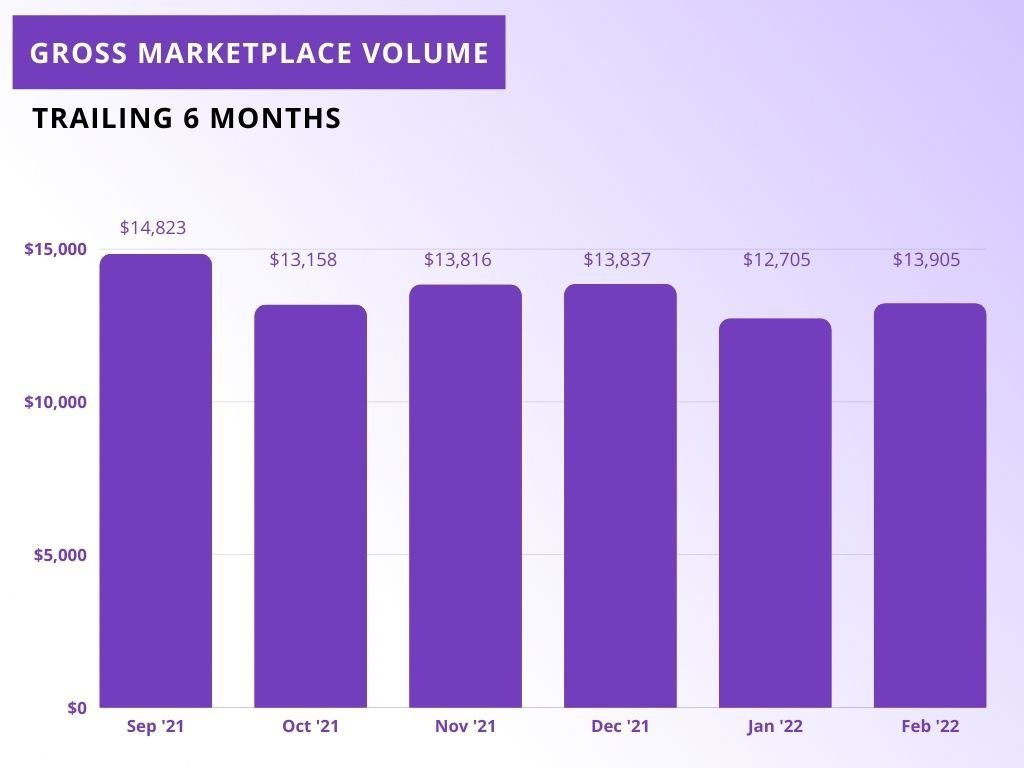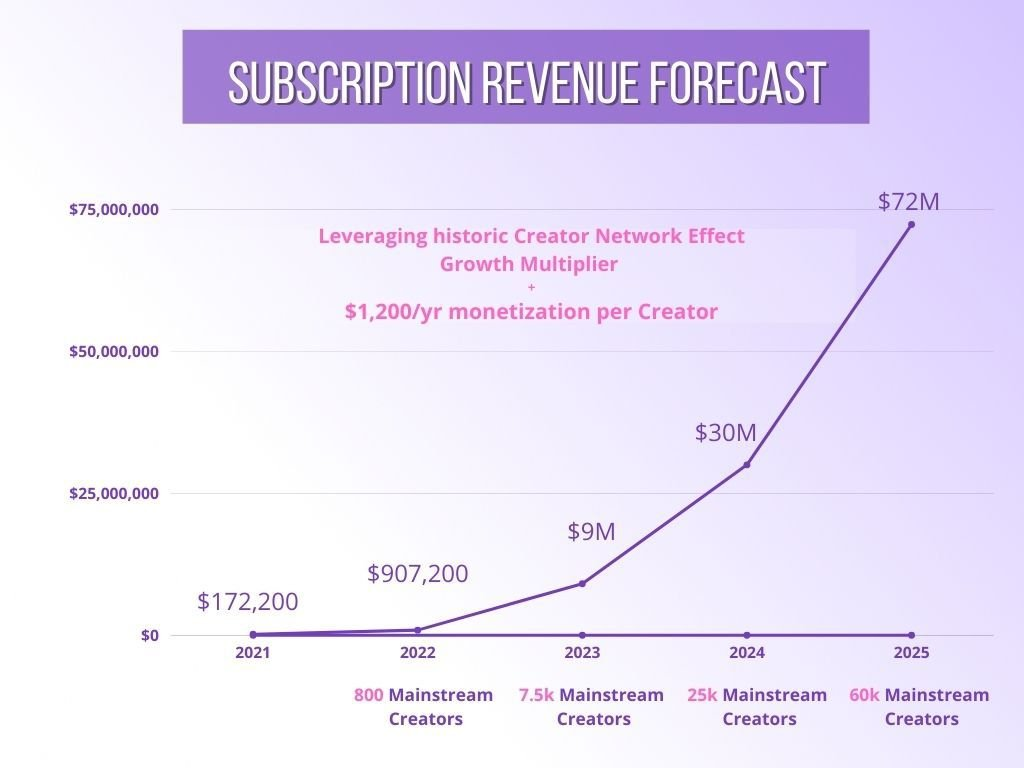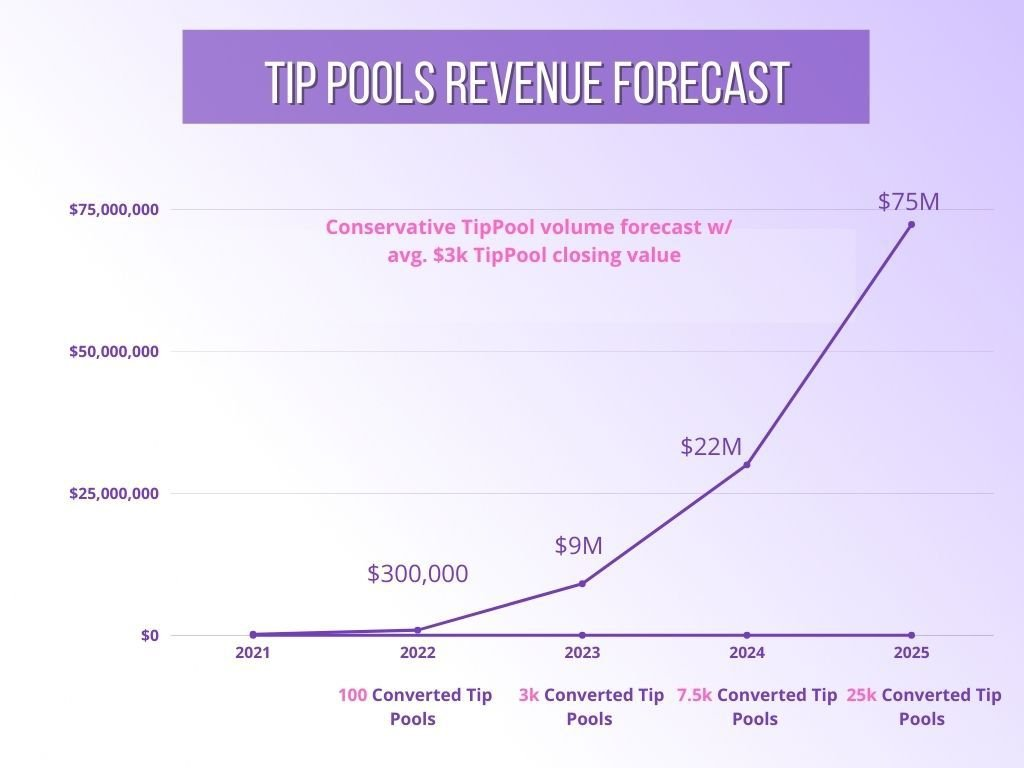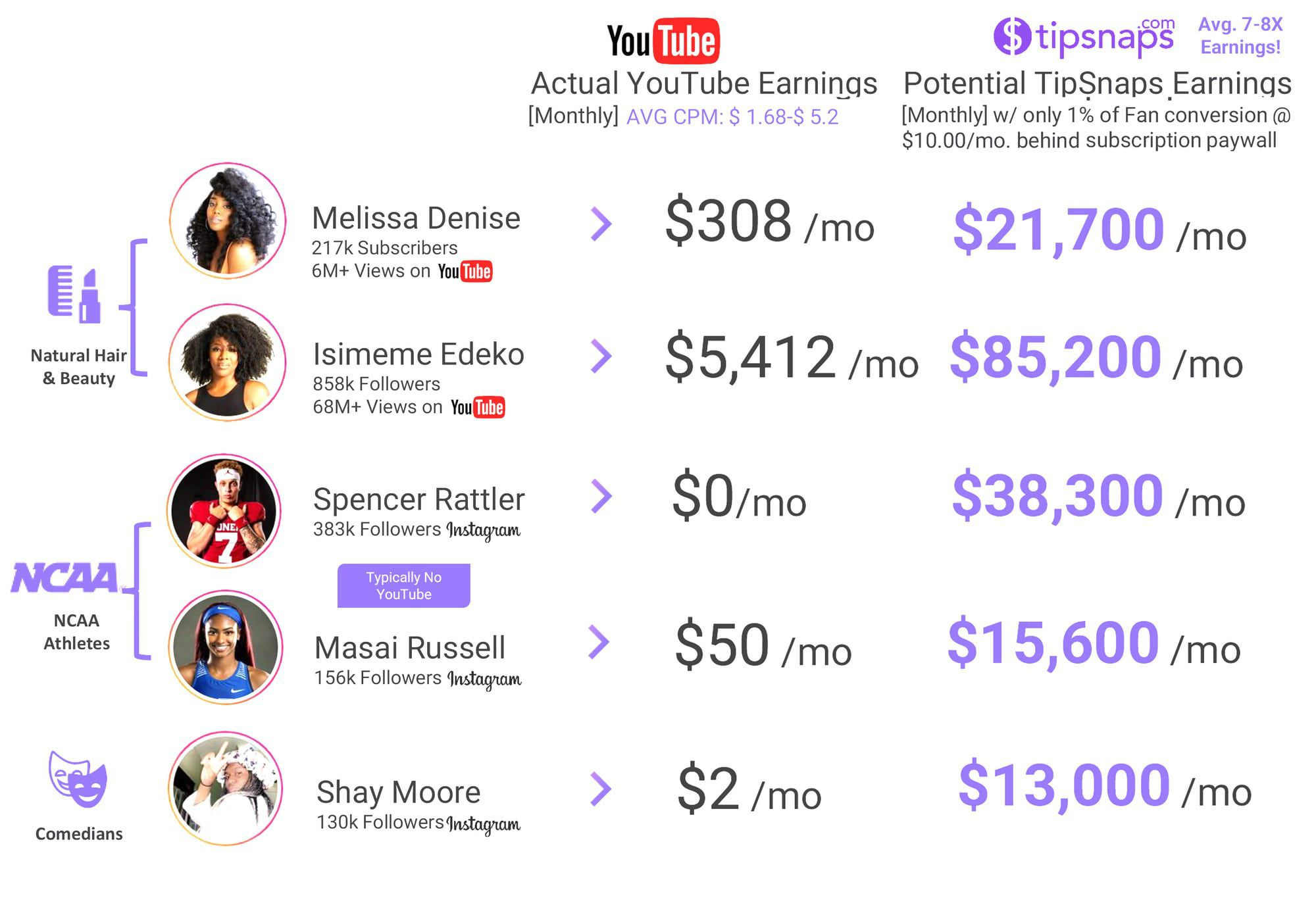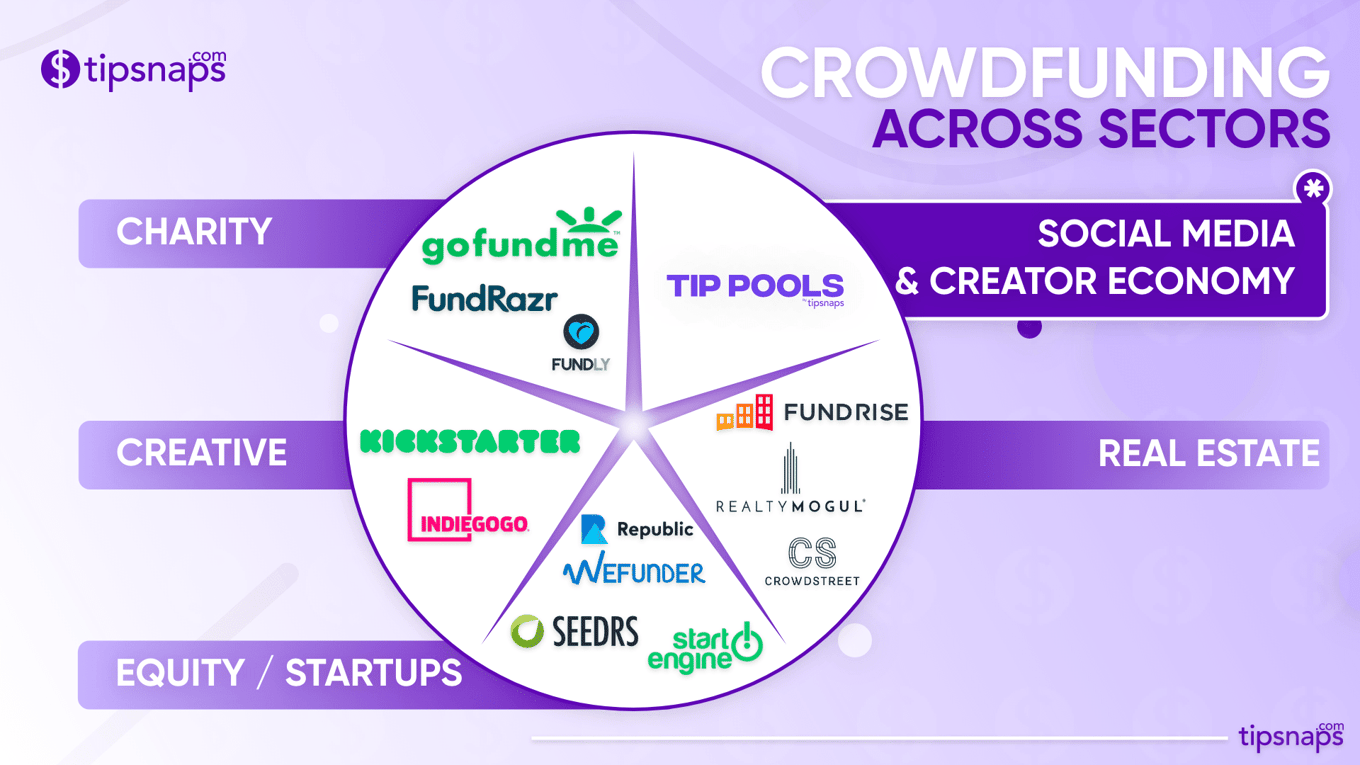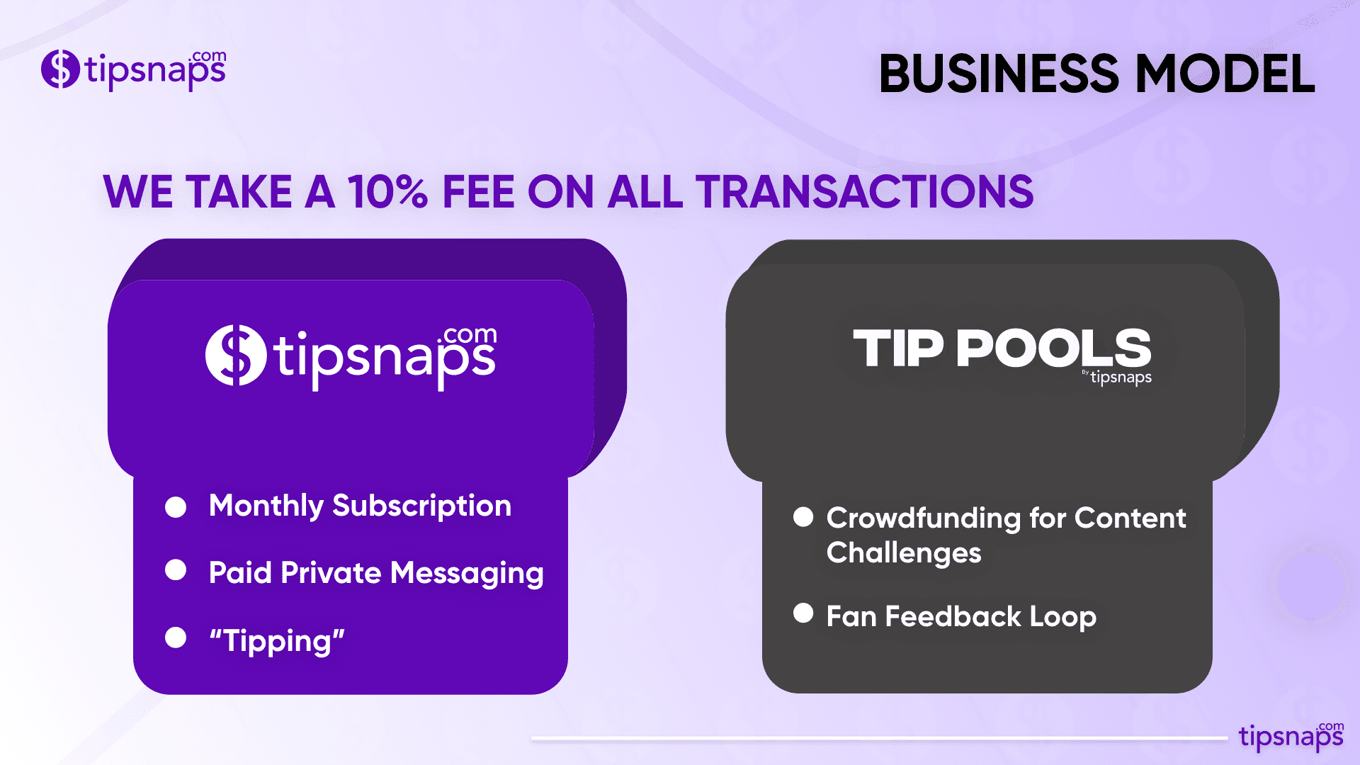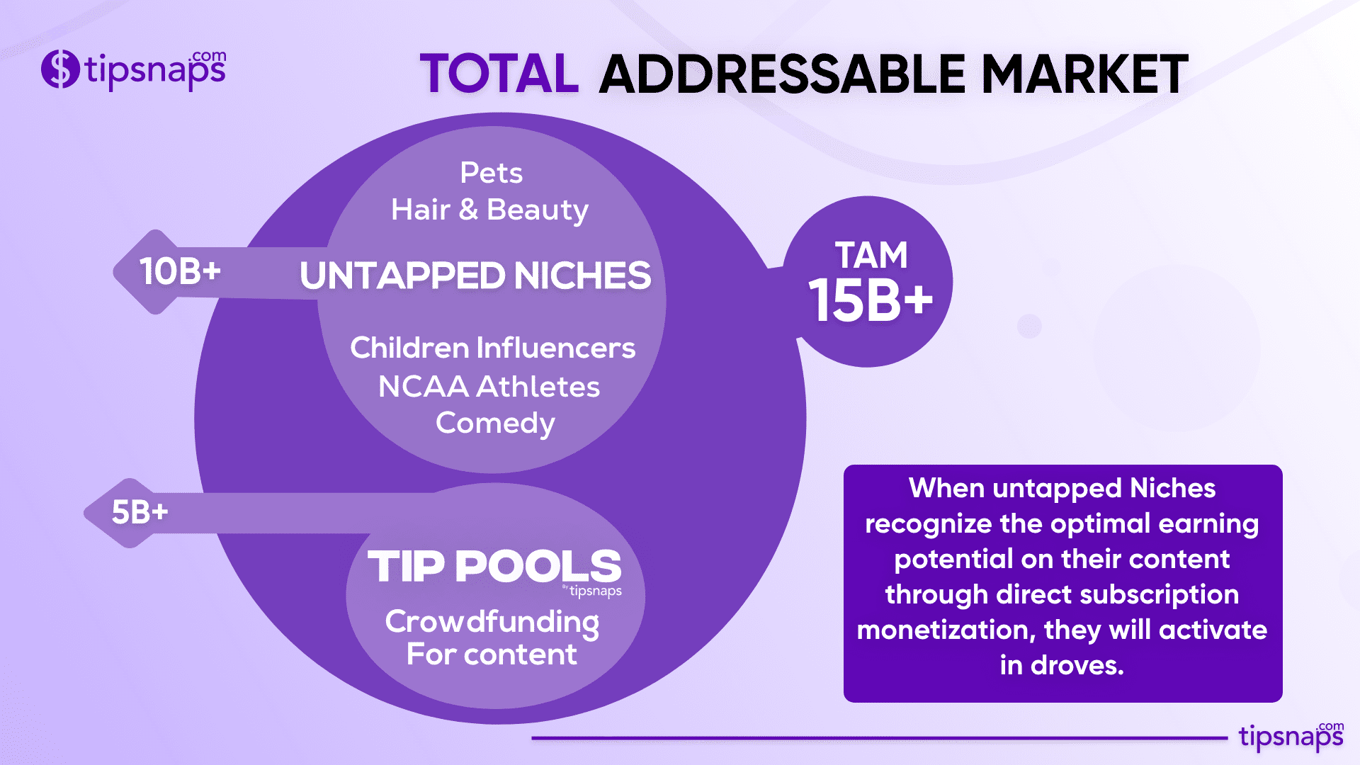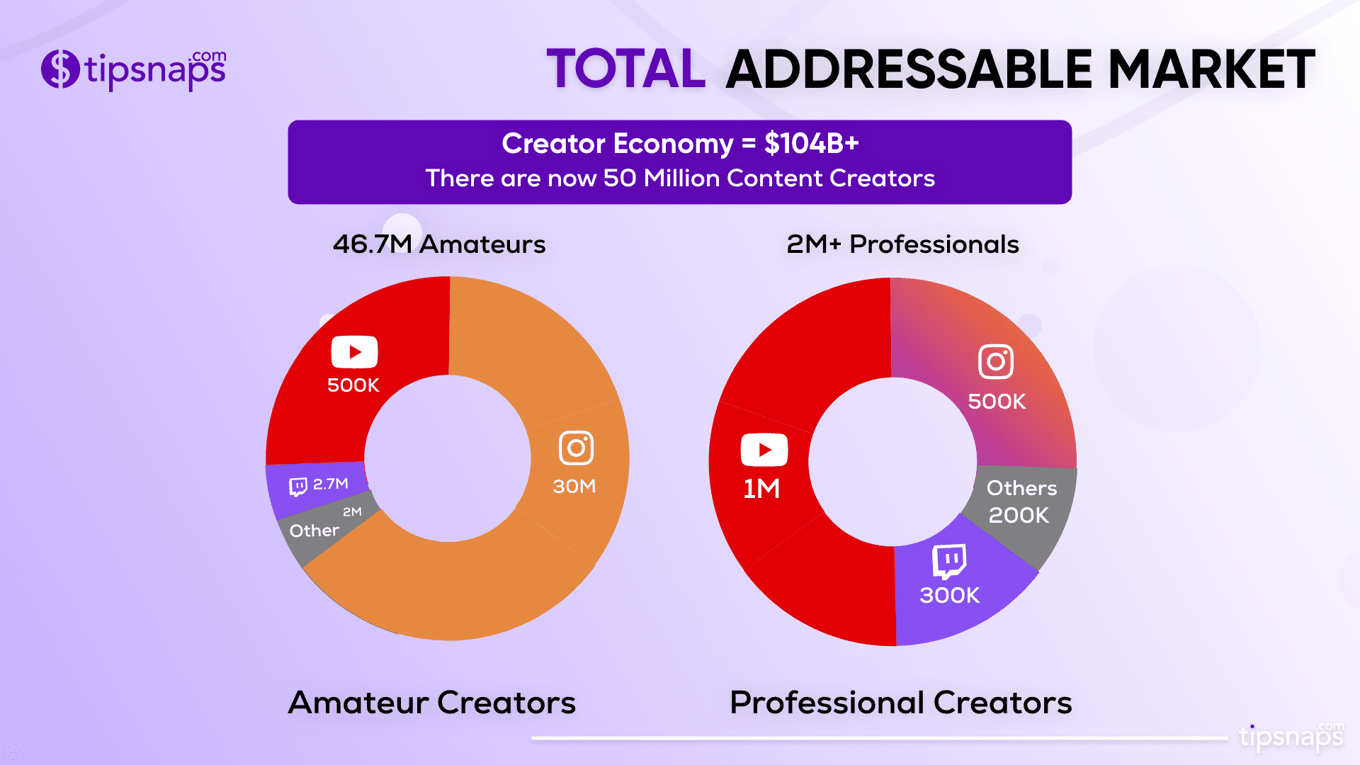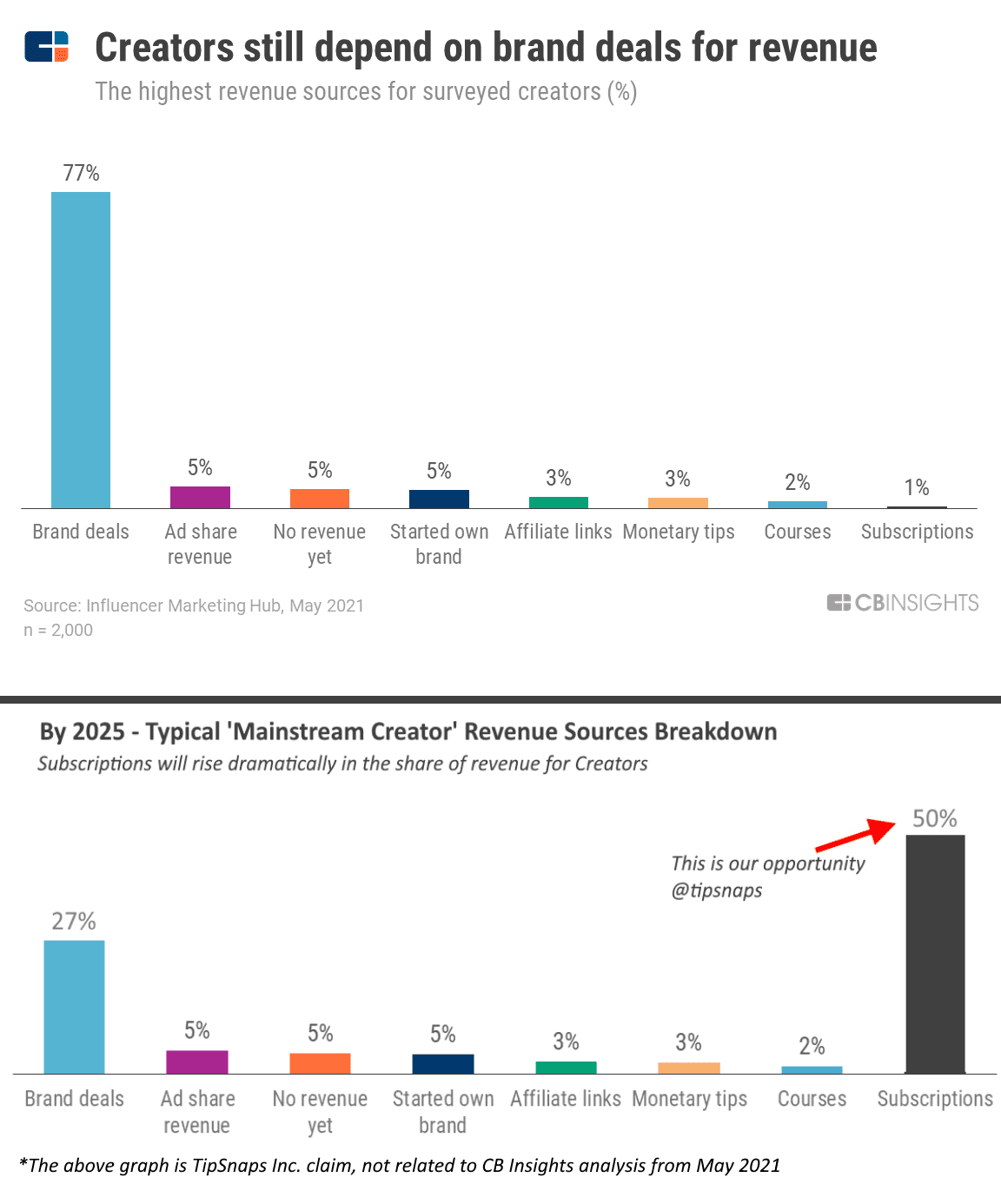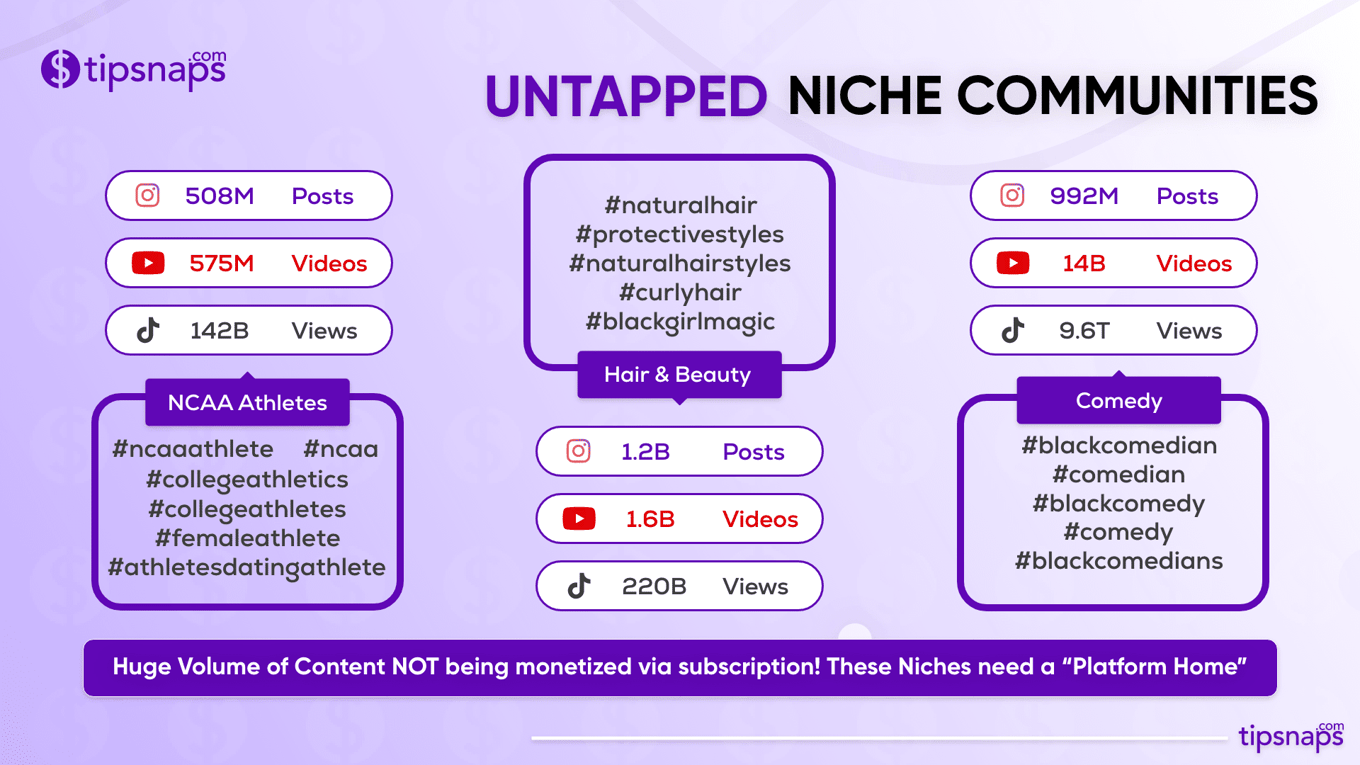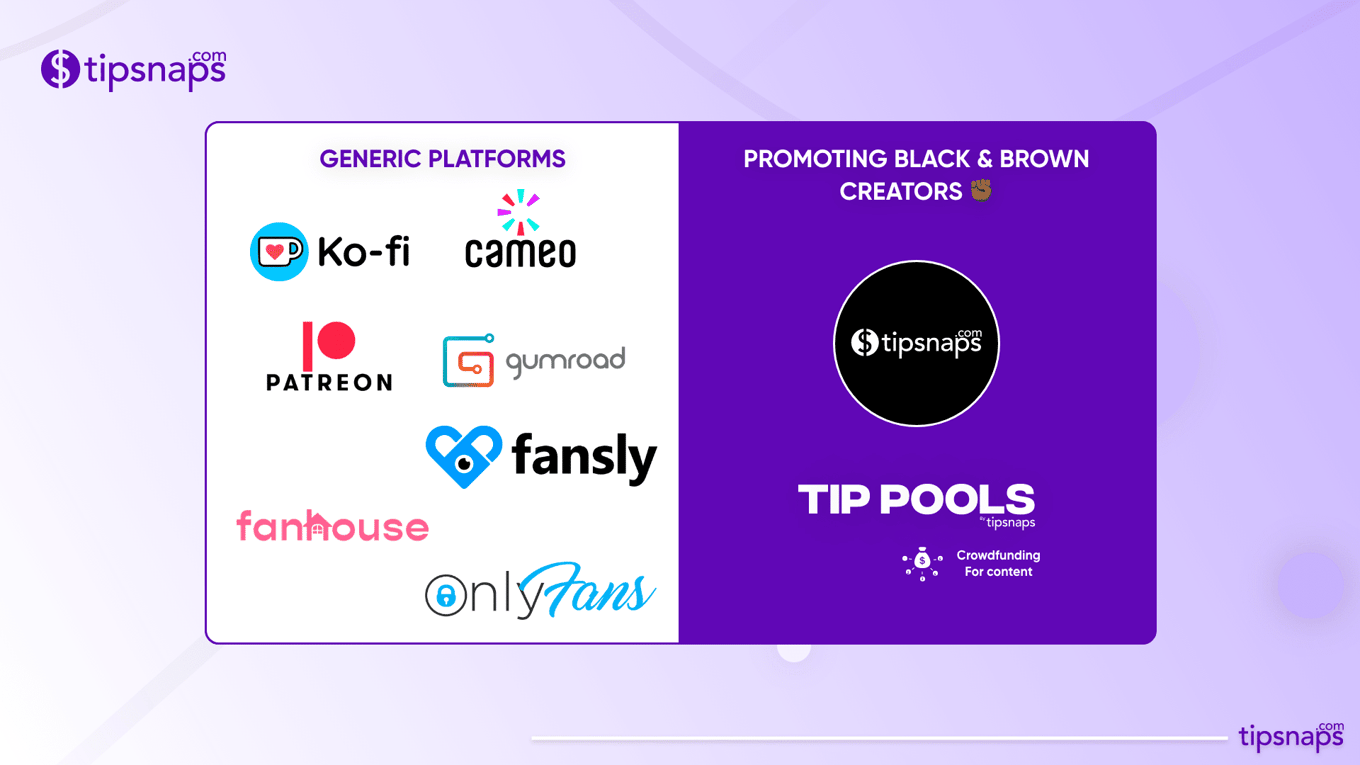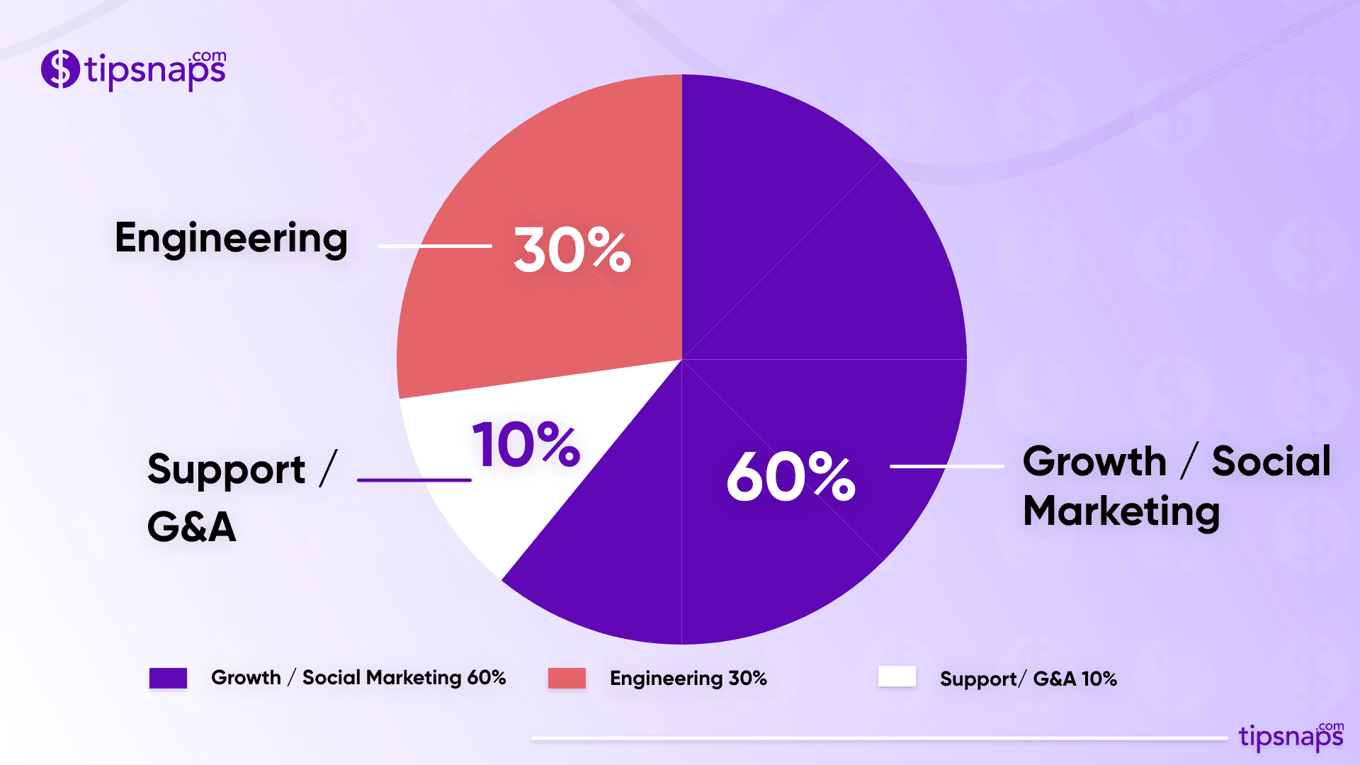TipSnaps
Enabling overlooked Creators + underserved Fans in the Creator Economy

Summary edit edit source
- Technical, capital-efficient, black founders—bootstrapped until 2021
- Nearly $2M in gross sales since launch
- 450K registered users, ~8M unique visitors since launch
- Focus on overlooked Creators: Black hair & beauty, athletes, comedians
- TipPools = Evolution of the Creator Economy | "Fans Crowdfund for Content"
Problem edit edit source
The creator economy is overlooking diverse Creators of color edit edit source
The creator economy has overlooked valuable and influential segments of the marketplace (particularly Black and Brown Creators) who drive culture on social media & over-index from a usage perspective. These Creators are taken for granted by incumbent platforms which are slow to activate subscription monetization and often do not offer ad revenue splits.
Fans are treated as an afterthought edit edit source
Creators dictate the price, duration, and the frequency of their content. Fans are 'left in the comments & DMs' with a "take it or leave it" deal. Fans have no leverage. Imagine if fans could collectively come together and request content they actually wanted! #PowerToTheFans
Solution edit edit source
#BlackOwned platform that promises Equity to Creators and Fans alike
TipSnaps' mission is to be the platform of choice for culture-driving creators, with a particular focus for creators of color, a historically underserved segment of the market.
1. Service overlooked niches with a focused experience edit edit source
2. Enable Fans to collectively have a voice by crowdfunding for content #PowerToTheFans edit edit source
Product edit edit source
Creators & Fans first
Promoting Creators of color who are overlooked by incumbent platforms | Empowering Fans to request the content they ACTUALLY want!
TipSnaps - Product Features edit edit source
Capabilities edit edit source
|
|
TipPools - How it works? edit edit source
Trailblazing a 'new category' within the Creator Economy. Think Change.org or GoFundMe—for social media & the Creator Economy! Gives fans the power to rally together for content they actually want to see.
- High virality component, fueled by trending and culture-shifting topics and content. Platform switching opportunity from incumbent platforms.
- Low fan risk. No credit card transaction unless the creator accepts the offer! Only contributors get to see the content if fulfilled.
Traction edit edit source
Not a theory, we have traction
Early Traction edit edit source
- Launched in 2017 | Creator Economy Pioneers
- Capital-Efficient: 100% bootstrapped until Jan 2021
- Developed, Launched, Go-to-Market in 2017 - organically grew to 300k+ Registered users with ZERO FUNDING. Fully bootstrapped.
2021 Traction edit edit source
- 663k Unique Visitors to site in 2021
- 2M+ Pageviews
- 25k Registered Users in 2021
- ~4k Registered Creators in 2021
- $172k in Gross Marketplace Volume 2021
In 2020, TipSnaps recognized massive inequities within the Creator Economy where content Creators of Color were being undervalued and mistreated on social media platforms. Thus, we decided to pivot our focus to highlight content Creators of Color and ensure that they had a platform that valued and supported their creativity.
Utilizing growth hacks, direct outreach, and our creator ambassadorship program, TipSnaps has helped Creators of Color truly recognize the value of direct monetization. Using our subscription-based model, creators have successfully optimized their monthly revenue streams. Our revenue over the last 6 months has remained steady, as we continue to onboard many diverse creators, all while creators become less reliant on brand deals and begin to fully utilize the direct monetization.
We are positioned to experience exponential growth, as we expect a massive network effect within our target niches. Since these are untapped markets, when 10-20 large creators within the niche adopt TipSnaps, the adoption will rapidly and broadly spread amongst the niche. The Revenue forecasts visualized below demonstrates this growth as we continue to onboard diverse creators who have yet to begin directly monetizing their content. Conservatively estimating $1,200/year per creator, we expect to see substantial year-over-year growth.
As an additional revenue opportunity for the company; TipPools is a completely untapped market with massive growth potential and we anticipate full adoption of this concept across all content niches by 2025. We conservatively project 100 TipPools to be converted and executed by the end of 2022 and we are forecasting that over the next 3 years TipPools will gain broad adoption across all online fan communities. We estimate very conservatively that there will be 25K TipPools in the calendar year 2025, with a conservative TipPool value of $3,000. You can imagine TipPools for large celebrities which run into the hundreds of thousands or millions of dollars.
Customers edit edit source
The case for direct monetization for Creators edit edit source
Opportunity: Every creator niche needs a HOME to directly monetize! Green open fields of untapped niches!
Fans yearn to Crowdfund for content edit edit source
but do not know it yet...
Crowdfunding has penetrated almost every area of the internet, except for social media content. The Creator Economy is the next breakthrough sector for crowdfunding. Every fan community can and will leverage TipPools to pool money together and offer it to their favorite creator in exchange for content they actually want to see! And it's ALL Fan-Initiated! The Fans do not need the permission of a creator to start a TipPool and there are zero-risks, as NO credit cards are charged unless the creator accepts the TipPool challenge!
Fans now have input on the content THEY want to see - This is REVOLUTIONARY!
Business model edit edit source
“With the internet and YouTube, there’s always the concern of being demonetized and having your channel canceled, so people are always looking for alternative ways to earn money,” YouTuber Joshua Wanders said in an interview with New York Times. “You never know where the platforms are going to take you at the end of the day.”

Market edit edit source
$15B+ TAM
Mainstream, untapped niches of Creators will lean into direct subscription monetization over the next 5 years. Currently Creators simply associate a platform to the action "I do YouTube." "I do Instagram." Soon they will say "I create and sell content for a living". They will favor and be loyal to the platforms that optimally enable them to monetize and best aligns with their personal brands. We will see a shift in Revenue sources for creators to primarily be powered by their Subscription paywalls.
Scraped data on incumbent platforms proves the opportunity edit edit source
We scraped incumbent platforms via hashtags such as #blackhair #ncaaathlete #blackcomedian and the results were staggering, but expected by us.
Fan Initiated TipPools = $5B Market by 2023 edit edit source
Conservatively estimating that “Crowdfunding for Content” is worth 10% of the volume from Onlyfans + Patreon alone—let alone the broader creator economy.
$10B+ per year by 2023 edit edit source
Considering the broad application of tip pools and fan driven crowdfunding for content; tip pools will span across all social networks and all niches. Natural evolution for the creator economy.
Competition edit edit source
TipSnaps value proposition edit edit source
- TipSnaps offers a tighter focus, greater customization, and a better rate for Creators to set up a subscription business.
- TipSnaps offers the first Fan feedback loop through TipPools for Fans to crowdfund for content!
Vision and strategy edit edit source
Use of funds edit edit source
Focusing on capturing untapped niches and TipPool adoption
Our primary objective is community growth. We have 3 amazing Gen Z growth managers we're ready to hire to help us drive growth in building community and capturing the niches we care about. The platform is LIVE and scale-ready now!
1-2x Growth Managers to focus on target niches:
- Black / Natural Hair & Beauty
- Athletes
- Instagram Comedians
Q2 '22 edit edit source
Laser focus on driving adoption of TipPools within valuable Fandom/communities.
- TikTok fashion & beauty fans
- TikTok comedian fans
- Instagram models fans
- Instagram & TikTok NCAA athletes fans
- Mega celebs/TMZ style fans
Q3’22 edit edit source
Focus on strategic partnerships, Creator Education and “White Glove” Creator support.
Target key strategic partnerships:
- Black/Natural beauty brand
- Comedy brand partnership
- NCAA Collegiate Program Partnership
Q4 '22 edit edit source
Key feature rollouts:
- Domain Registrar - Enable Creator Domain Registration within App
- Creator Monthly Asset Upload Minimums
- Brand Affiliate program
- NFTs -
Live Events & Partnerships:
- "TipSnaps: For the Culture” Creator Conferences —NYC/LA/ATL/Houston
- TipSnaps Producer Program (linking up Creators with local Videographers/Photographers)
- Creator Meet & Greets (Facilitating Fan Meet & Greets in major metros within the US)
Funding edit edit source
Founders edit edit source
Lyonel Dougé
CEO/CTO
University of Pittsburgh - BS in Computer Engineering/Science
12+ years experience in enterprise IT/software engineering - with a proven track record of delivering digital products for Fortune 500 companies.
Background. Digital Product Management | Johnson & Johnson,
Managed web platform where 500+ J&J Consumer websites hosted (including listerine.com, johnsonsbaby.com & aveeno.com)
Software Engineer @ Sony Music & ViacomCBS & NFL
Lyonel personally developed and launched TipSnaps v1 single-handedly while holding a full time Product Manager job @Johnson and Johnson.
Forced to moonlight nights and weekends because of no access to venture capital. Bootstrapped from 2017-2021 without any angel funding.
Vic Boddie Ph.D.
COO
HBCU Graduate - Hampton University (B.S.) and Howard University - Microbiology (Ph.D.)
FDA - 9+ years | Supervisor - Science, Policy, and Consumer Health Expert
Chairman of the Diversity, Equity, and Inclusion (DEI) council at the FDA
Consulted in Business Development & Growth Marketing for several startups prior to joining TipSnaps in 2021 as a Co-Founder
TipSnaps Team edit edit source
Lyonel Douge
Founder/CTO
Vic Boddie, Ph.D.
Co-Founder/COO
Aaron Pempel
Advisor - Nike
Darla Vaughn
Advisor - Emerson Collective
Aaron Samuels
Advisor - Co-Founder, Blavity Inc.
Ellis Taliaferro
Architect / Technical Advisor
Artur Edylin
Developer
Eduard Sargsyan
Developer
Ralph Villanueva
Support Lead
Risks edit edit source
The Company may also end the Offering early.
If the Target Offering Amount is met after 21 calendar days, but before the Offering Deadline, the Company can end the Offering by providing notice to Investors at least 5 business days prior to the end of the Offering. This means your failure to participate in the Offering in a timely manner, may prevent you from being able to invest in this Offering – it also means the Company may limit the amount of capital it can raise during the Offering by ending the Offering early.
The Company may need additional funding as it continues to invest in research and development and expand internationally.
The Company may need to raise additional funds by way of a primary offering of shares of The Company common stock, which would dilute existing shareholders. The Company may also raise additional funds through additional borrowings. To obtain such funding, The Company may need to pledge assets and agree to certain financial covenants.
The Company may not have the right product/market fit.
The Company’s business depends upon attracting new subscribers and retaining existing ones. To do so, it must provide products with an attractive value proposition. The Company may fail to do that if it: • fails to innovate and provide new and useful features that its users and subscribers want; • releases products that fail to reliably operate (due to bugs or service interruptions); • releases products too late relative to competitors; • prices its products in an uncompetitive manner; or • fails to educate its users and subscribers about its features.
The amount of capital the Company is attempting to raise in this Offering may not be enough to sustain the Company’s current business plan.
In order to achieve the Company’s near and long-term goals, the Company may need to procure funds in addition to the amount raised in the Offering. There is no guarantee the Company will be able to raise such funds on acceptable terms or at all. If we are not able to raise sufficient capital in the future, we may not be able to execute our business plan, our continued operations will be in jeopardy and we may be forced to cease operations and sell or otherwise transfer all or substantially all of our remaining assets, which could cause an Investor to lose all or a portion of their investment.
The Company’s success depends on the experience and skill of the board of directors, its executive officers and key employees.
We are dependent on our board of directors, executive officers and key employees. These persons may not devote their full time and attention to the matters of the Company. The loss of our board of directors, executive officers and key employees could harm the Company’s business, financial condition, cash flow and results of operations.
The Company may fail to comply with applicable privacy laws.
The Company is subject to numerous laws governing the use of personal information, including sensitive personal information, such as financial information and demographic information. The failure to comply with applicable privacy laws could lead to regulatory actions, including the possibility of fines, class-action or traditional litigation, reputational harm and/or costly investigation and remedial efforts.
We have a limited operating history upon which you can evaluate our performance, and accordingly, our prospects must be considered in light of the risks that any new company encounters.
The Company is still in an early phase and we are just beginning to implement our business plan. There can be no assurance that we will ever operate profitably. The likelihood of our success should be considered in light of the problems, expenses, difficulties, complications and delays usually encountered by early stage companies. The Company may not be successful in attaining the objectives necessary for it to overcome these risks and uncertainties.
Global crises such as COVID-19 can have a significant effect on our business operations and revenue projections.
With shelter-in-place orders and non-essential business closings potentially happening throughout 2020, 2021, 2022 and into the future due to COVID-19, the Company’s revenue has been adversely affected.
We may face potential difficulties in obtaining capital.
We may have difficulty raising needed capital in the future as a result of, among other factors, our lack of revenues from sales, as well as the inherent business risks associated with our Company and present and future market conditions. Our business currently does not generate any sales and future sources of revenue may not be sufficient to meet our future capital requirements. We will require additional funds to execute our business strategy and conduct our operations. If adequate funds are unavailable, we may be required to delay, reduce the scope of or eliminate one or more of our research, development or commercialization programs, product launches or marketing efforts, any of which may materially harm our business, financial condition and results of operations.
We may not have enough authorized capital stock to issue shares of common stock to investors upon the conversion of any security convertible into shares of our common stock, including the Securities.
Currently, our authorized capital stock consists of 10,000,000 shares of common stock, of which 5,000,000 shares of common stock are issued and outstanding. Unless we increase our authorized capital stock, we may not have enough authorized common stock to be able to obtain funding by issuing shares of our common stock or securities convertible into shares of our common stock. We may also not have enough authorized capital stock to issue shares of common stock to investors upon the conversion of any security convertible into shares of our common stock, including the Securities.
There is no guarantee of a return on an Investor’s investment.
There is no assurance that an Investor will realize a return on their investment or that they will not lose their entire investment. For this reason, each Investor should read this Form C and all exhibits carefully and should consult with their attorney and business advisor prior to making any investment decision.
We may implement new lines of business or offer new products and services within existing lines of business.
As an early-stage company, we may implement new lines of business at any time. There are substantial risks and uncertainties associated with these efforts, particularly in instances where the markets are not fully developed. In developing and marketing new lines of business and/or new products and services, we may invest significant time and resources. Initial timetables for the introduction and development of new lines of business and/or new products or services may not be achieved, and price and profitability targets may not prove feasible. We may not be successful in introducing new products and services in response to industry trends or developments in technology, or those new products may not achieve market acceptance. As a result, we could lose business, be forced to price products and services on less advantageous terms to retain or attract clients or be subject to cost increases. As a result, our business, financial condition or results of operations may be adversely affected.
We rely on other companies to provide components and services for our products.
We depend on suppliers and contractors to meet our contractual obligations to our customers and conduct our operations. Our ability to meet our obligations to our customers may be adversely affected if suppliers or contractors do not provide the agreed-upon supplies or perform the agreed-upon services in compliance with customer requirements and in a timely and cost-effective manner. Likewise, the quality of our products may be adversely impacted if companies to whom we delegate manufacture of major components or subsystems for our products, or from whom we acquire such items, do not provide components which meet required specifications and perform to our and our customers’ expectations. Our suppliers may be unable to quickly recover from natural disasters and other events beyond their control and may be subject to additional risks such as financial problems that limit their ability to conduct their operations. The risk of these adverse effects may be greater in circumstances where we rely on only one or two contractors or suppliers for a particular component. Our products may utilize custom components available from only one source. Continued availability of those components at acceptable prices, or at all, may be affected for any number of reasons, including if those suppliers decide to concentrate on the production of common components instead of components customized to meet our requirements. The supply of components for a new or existing product could be delayed or constrained, or a key manufacturing vendor could delay shipments of completed products to us adversely affecting our business and results of operations.
We rely on various intellectual property rights, including trademarks, in order to operate our business.
The Company relies on certain intellectual property rights to operate its business. The Company’s intellectual property rights may not be sufficiently broad or otherwise may not provide us a significant competitive advantage. In addition, the steps that we have taken to maintain and protect our intellectual property may not prevent it from being challenged, invalidated, circumvented or designed-around, particularly in countries where intellectual property rights are not highly developed or protected. In some circumstances, enforcement may not be available to us because an infringer has a dominant intellectual property position or for other business reasons, or countries may require compulsory licensing of our intellectual property. Our failure to obtain or maintain intellectual property rights that convey competitive advantage, adequately protect our intellectual property or detect or prevent circumvention or unauthorized use of such property, could adversely impact our competitive position and results of operations. We also rely on nondisclosure and noncompetition agreements with employees, consultants and other parties to protect, in part, trade secrets and other proprietary rights. There can be no assurance that these agreements will adequately protect our trade secrets and other proprietary rights and will not be breached, that we will have adequate remedies for any breach, that others will not independently develop substantially equivalent proprietary information or that third parties will not otherwise gain access to our trade secrets or other proprietary rights. As we expand our business, protecting our intellectual property will become increasingly important. The protective steps we have taken may be inadequate to deter our competitors from using our proprietary information. In order to protect or enforce our patent rights, we may be required to initiate litigation against third parties, such as infringement lawsuits. Also, these third parties may assert claims against us with or without provocation. These lawsuits could be expensive, take significant time and could divert management’s attention from other business concerns. The law relating to the scope and validity of claims in the technology field in which we operate is still evolving and, consequently, intellectual property positions in our industry are generally uncertain. We cannot assure you that we will prevail in any of these potential suits or that the damages or other remedies awarded, if any, would be commercially valuable.
Although dependent on certain key personnel, the Company does not have any key person life insurance policies on any such people.
We are dependent on certain key personnel in order to conduct our operations and execute our business plan, however, the Company has not purchased any insurance policies with respect to those individuals in the event of their death or disability. Therefore, if any of these personnel die or become disabled, the Company will not receive any compensation to assist with such person’s absence. The loss of such person could negatively affect the Company and our operations. We have no way to guarantee key personnel will stay with the Company, as many states do not enforce non-competition agreements, and therefore acquiring key man insurance will not ameliorate all of the risk of relying on key personnel.
Damage to our reputation could negatively impact our business, financial condition and results of operations.
Our reputation and the quality of our brand are critical to our business and success in existing markets, and will be critical to our success as we enter new markets. Any incident that erodes consumer loyalty for our brand could significantly reduce its value and damage our business. We may be adversely affected by any negative publicity, regardless of its accuracy. Also, there has been a marked increase in the use of social media platforms and similar devices, including blogs, social media websites and other forms of internet-based communications that provide individuals with access to a broad audience of consumers and other interested persons. The availability of information on social media platforms is virtually immediate as is its impact. Information posted may be adverse to our interests or may be inaccurate, each of which may harm our performance, prospects or business. The harm may be immediate and may disseminate rapidly and broadly, without affording us an opportunity for redress or correction.
The Company has the right to limit individual Investor commitment amounts based on the Company’s determination of an Investor’s sophistication.
The Company may prevent any Investor from committing more than a certain amount in this Offering based on the Company’s determination of the Investor’s sophistication and ability to assume the risk of the investment. This means that your desired investment amount may be limited or lowered based solely on the Company’s determination and not in line with relevant investment limits set forth by the Regulation CF rules. This also means that other Investors may receive larger allocations of the Offering based solely on the Company’s determination.
Our business could be negatively impacted by cyber security threats, attacks and other disruptions.
We continue to face advanced and persistent attacks on our information infrastructure where we manage and store various proprietary information and sensitive/confidential data relating to our operations. These attacks may include sophisticated malware (viruses, worms, and other malicious software programs) and phishing emails that attack our products or otherwise exploit any security vulnerabilities. These intrusions sometimes may be zero-day malware that are difficult to identify because they are not included in the signature set of commercially available antivirus scanning programs. Experienced computer programmers and hackers may be able to penetrate our network security and misappropriate or compromise our confidential information or that of our customers or other third-parties, create system disruptions, or cause shutdowns. Additionally, sophisticated software and applications that we produce or procure from third-parties may contain defects in design or manufacture, including “bugs” and other problems that could unexpectedly interfere with the operation of the information infrastructure. A disruption, infiltration or failure of our information infrastructure systems or any of our data centers as a result of software or hardware malfunctions, computer viruses, cyber-attacks, employee theft or misuse, power disruptions, natural disasters or accidents could cause breaches of data security, loss of critical data and performance delays, which in turn could adversely affect our business.
Security breaches of confidential customer information, in connection with our electronic processing of credit and debit card transactions, or confidential employee information may adversely affect our business.
Our business requires the collection, transmission and retention of personally identifiable information, in various information technology systems that we maintain and in those maintained by third parties with whom we contract to provide services. The integrity and protection of that data is critical to us. The information, security and privacy requirements imposed by governmental regulation are increasingly demanding. Our systems may not be able to satisfy these changing requirements and customer and employee expectations, or may require significant additional investments or time in order to do so. A breach in the security of our information technology systems or those of our service providers could lead to an interruption in the operation of our systems, resulting in operational inefficiencies and a loss of profits. Additionally, a significant theft, loss or misappropriation of, or access to, customers’ or other proprietary data or other breach of our information technology systems could result in fines, legal claims or proceedings.
The Company’s total addressable market may prove to be smaller than it expects.
While the Company believes, based upon internal data, that every small and midsized business and every larger enterprise will need an online video presence to succeed, the number of entities that are willing and able to pay fees for software-based video services may not be as large as it expects. The Company has not conducted research by a third party to validate its data and thesis.
The use of individually identifiable data by our business, our business associates and third parties is regulated at the state, federal and international levels.
The regulation of individual data is changing rapidly, and in unpredictable ways. A change in regulation could adversely affect our business, including causing our business model to no longer be viable. Costs associated with information security – such as investment in technology, the costs of compliance with consumer protection laws and costs resulting from consumer fraud – could cause our business and results of operations to suffer materially. Additionally, the success of our online operations depends upon the secure transmission of confidential information over public networks, including the use of cashless payments. The intentional or negligent actions of employees, business associates or third parties may undermine our security measures. As a result, unauthorized parties may obtain access to our data systems and misappropriate confidential data. There can be no assurance that advances in computer capabilities, new discoveries in the field of cryptography or other developments will prevent the compromise of our customer transaction processing capabilities and personal data. If any such compromise of our security or the security of information residing with our business associates or third parties were to occur, it could have a material adverse effect on our reputation, operating results and financial condition. Any compromise of our data security may materially increase the costs we incur to protect against such breaches and could subject us to additional legal risk.
The Company is not subject to Sarbanes-Oxley regulations and may lack the financial controls and procedures of public companies.
The Company may not have the internal control infrastructure that would meet the standards of a public company, including the requirements of the Sarbanes Oxley Act of 2002. As a privately-held (non-public) Company, the Company is currently not subject to the Sarbanes Oxley Act of 2002, and its financial and disclosure controls and procedures reflect its status as a development stage, non-public company. There can be no guarantee that there are no significant deficiencies or material weaknesses in the quality of the Company's financial and disclosure controls and procedures. If it were necessary to implement such financial and disclosure controls and procedures, the cost to the Company of such compliance could be substantial and could have a material adverse effect on the Company’s results of operations.
We operate in a highly regulated environment, and if we are found to be in violation of any of the federal, state, or local laws or regulations applicable to us, our business could suffer.
We are also subject to a wide range of federal, state, and local laws and regulations, such as local licensing requirements, and retail financing, debt collection, consumer protection, environmental, health and safety, creditor, wage-hour, anti-discrimination, whistleblower and other employment practices laws and regulations and we expect these costs to increase going forward. The violation of these or future requirements or laws and regulations could result in administrative, civil, or criminal sanctions against us, which may include fines, a cease and desist order against the subject operations or even revocation or suspension of our license to operate the subject business. As a result, we have incurred and will continue to incur capital and operating expenditures and other costs to comply with these requirements and laws and regulations.
The Company has the right to extend the Offering Deadline.
The Company may extend the Offering Deadline beyond what is currently stated herein. This means that your investment may continue to be held in escrow while the Company attempts to raise the Target Offering Amount even after the Offering Deadline stated herein is reached. While you have the right to cancel your investment in the event the Company extends the Offering Deadline, if you choose to reconfirm your investment, your investment will not be accruing interest during this time and will simply be held until such time as the new Offering Deadline is reached without the Company receiving the Target Offering Amount, at which time it will be returned to you without interest or deduction, or the Company receives the Target Offering Amount, at which time it will be released to the Company to be used as set forth herein. Upon or shortly after the release of such funds to the Company, the Securities will be issued and distributed to you.
The Company’s growth and profitability depend upon a wide variety of factors, some of which are out of the Company’s control.
Whether the Company can grow its revenue and ultimately achieve profitability will depend upon a number of factors including: • The Company’s reputation and brand recognition; • demand for the types of video services the Company offers; • the actual and perceived quality, integrity and value of the video services the Company provides; • The Company’s development and timely deployment of innovative video services that provide value to its users and subscribers; • The Company’s ability to price its video services competitively; • The Company’s ability to acquire new subscribers sustainably, through a combination of organic efforts (continuing to convert a meaningful portion of its free user base into paying subscribers), paid acquisition (marketing), sales efforts (for enterprise) and partnerships; • The Company’s ability to retain and upsell existing subscribers by continuing to provide them with value; • the scalability of the Company’s technology platform; • the quality of the Company’s support and onboarding efforts for users and subscribers; • the growth of the Company’s employee base in a highly competitive market for talent; • The Company’s ability to expand internationally; • The Company’s ability to successfully integrate new businesses that it acquires; • changes in laws that allow the Company to host and distribute large quantities of user and subscriber content; and • domestic and global macroeconomic conditions.
Competition in the Company’s market is intense.
The Company operates in a highly competitive market. It competes with both large social media networks and a variety of niche software providers for business customers. Large social media networks provide their services for free and offer features such as a large built-in audience, social media features and the ability to monetize through advertising. Niche providers include large, well-funded companies and new entrants. Either may be able to provide more compelling features than the Company within their area of focus. In addition, the Company expects that more competitors will emerge given the relatively low barriers to entry for software-based video creation applications, particularly mobile-based applications. New competitors could take the form of start-ups or large, well-funded companies that already operate in markets adjacent to the Company.
The Company may not be able to scale its business effectively.
The Company may not be able to capitalize on the market’s demand for video if it cannot scale its operations. For example, the Company might experience delays in onboarding new customers and responding to increased customer support tickets, and it may not be able to handle increased loads on its servers during peak times. All of these things would result in missed opportunities or user and subscriber frustration that could negatively affect user and subscriber growth and retention.
The success of the Company will depend upon its continued ability to identify, hire, develop, motivate and retain highly skilled individuals worldwide.
In order to build and scale its business, the Company will need to further increase its employee base, particularly in the areas of engineering, product development, sales (domestically and internationally), customer support and shared services. The Company’s ability to attract and retain talent and to fully experience the benefits of that talent depends upon: The Company’s reputation; The Company’s ability to successfully onboard new employees; The Company’s commitment to diversity, equity, and inclusion; and the competitive landscape in the geographic markets for talent in which the Company competes.
The Company’s success depends, in substantial part, on its ability to market, distribute and monetize its products and services through search engines, digital app stores and social media platforms.
The marketing, distribution and monetization of the Company’s products and services depend on its ability to cultivate and maintain cost-effective and otherwise satisfactory relationships with search engines, digital app stores and social media platforms, in particular, those operated by Apple, Google and Facebook. These platforms could decide not to market and distribute some or all of the Company’s products and services, change their terms and conditions of use at any time (and without notice), favor their own products and services over those of the Company and/or significantly increase their fees. While the Company expects to maintain cost-effective and otherwise satisfactory relationships with these platforms, no assurances can be provided that the Company will be able to do so and its inability to do so in the case of one or more of these platforms could have a material adverse effect on the Company’s business, financial condition and results of operations. TOC
The Company’s business involves hosting large quantities of user content.
The Company does not (and cannot undertake to) review all or even a significant portion of the videos uploaded to its platform to ensure that the videos do not violate any law or third-party rights. Some of the videos uploaded to the Company’s platform will invariably violate a third party’s rights or a law, rule or regulation, and if so, the Company could, in turn, face lawsuits, liability and negative publicity for hosting such content.
The Company collects, stores, and processes large amounts of video content and personal information of its users and subscribers.
The Company collects, stores and processes large amounts of video content and personal information of its users and subscribers. The Company also shares such information, where appropriate, with third parties that help it operate its business. Despite the Company’s efforts, it may fail to properly secure its systems and its user and subscriber data. This could be caused by technical issues (bugs), human error or internal or external malfeasance, and could lead to unauthorized disclosure of data, unauthorized changes or data losses. For example, the Company routinely receives reports from security researchers regarding potential vulnerabilities in its applications. The existence of such vulnerabilities, if undetected or detected but not remediated, could result in unauthorized access to the Company systems or the data of the Company users and subscribers. A data breach could expose the Company to regulatory actions and litigation. Depending on the circumstances, the Company may be required to disclose a suspected breach to regulators, affected individuals and/or the public. This could lead to regulatory actions, including the possibility of fines, class-action or traditional litigation by affected individuals, reputational harm, costly investigation and remedial efforts, the triggering of indemnification obligations under data-protection agreements with subscribers, vendors, and partners and/or higher premiums for cyber insurance.
The Company's management may have broad discretion in how the Company uses the net proceeds of the Offering.
Unless the Company has agreed to a specific use of the proceeds from the Offering, the Company’s management will have considerable discretion over the use of proceeds from the Offering. You may not have the opportunity, as part of your investment decision, to assess whether the proceeds are being used appropriately.
Compliance obligations imposed by new privacy laws or industry practices may adversely affect the Comany’s business.
New laws could restrict the Company’s ability to conduct marketing (by, for example, restricting the emailing or targeting users or use certain technologies like artificial intelligence). Similarly, private-market participants may deploy technologies or require certain practices that limit the Company’s ability to obtain or use certain information about its users and subscribers. If these types of changes are implemented, the Company’s ability to determine how its users and subscribers are using its video services and to use targeted advertising in a cost-
The Company may fail to comply with laws regulating subscriptions and free trials.
There are various laws regulating such offers, such as the U.S. Restore Online Shoppers Confidence Act (“ROSCA”) and analogous state-level laws. Non-compliance could result in voided contracts, lost revenue, damages and class action or traditional lawsuits.
Changes in laws or industry practices concerning subscription services may have a negative impact on renewal rates.
New laws or interpretations of existing laws may impose obligations that make it difficult or impossible to implement the automatic renewal of subscription to the Company’s video service. Private entities involved in payment collection and processing may also effectively regulate subscriptions to the Company’s video services. Failure to comply with these rules could result in the Company’s inability to process automatic renewals. Finally, the Company has no control over policy decisions by app platforms regarding automatic renewals. Policy changes by app platforms could adversely impact the Company’s renewal rates for subscription to its video services, and in turn, its business.
State and federal securities laws are complex, and the Company could potentially be found to have not complied with all relevant state and federal securities law in prior offerings of securities. .
The Company has conducted previous offerings of securities and may not have complied with all relevant state and federal securities laws. If a court or regulatory body with the required jurisdiction ever concluded that the Company may have violated state or federal securities laws, any such violation could result in the Company being required to offer rescission rights to investors in such offering. If such investors exercised their rescission rights, the Company would have to pay to such investors an amount of funds equal to the purchase price paid by such investors plus interest from the date of any such purchase. No assurances can be given the Company will, if it is required to offer such investors a rescission right, have sufficient funds to pay the prior investors the amounts required or that proceeds from this Offering would not be used to pay such amounts. In addition, if the Company violated federal or state securities laws in connection with a prior offering and/or sale of its securities, federal or state regulators could bring an enforcement, regulatory and/or other legal action against the Company which, among other things, could result in the Company having to pay substantial fines and be prohibited from selling securities in the future.
The Company could potentially be found to have not complied with securities law in connection with this Offering related to “Testing the Waters.”
Prior to filing this Form C, the Company engaged in “testing the waters” permitted under Regulation Crowdfunding (17 CFR 227.206), which allows issuers to communicate to determine whether there is interest in the offering. All communication sent is deemed to be an offer of securities for purposes of the antifraud provisions of federal securities laws. Any Investor who expressed interest prior to the date of this Offering should read this Form C thoroughly and rely only on the information provided herein and not on any statement made prior to the Offering. The communications sent to Investors prior to the Offering are attached as Exhibit E. Some of these communications may not have included proper disclaimers required for “testing the waters”.
The U.S. Securities and Exchange Commission does not pass upon the merits of the Securities or the terms of the Offering, nor does it pass upon the accuracy or completeness of any Offering document or literature.
You should not rely on the fact that our Form C is accessible through the U.S. Securities and Exchange Commission’s EDGAR filing system as an approval, endorsement or guarantee of compliance as it relates to this Offering. The U.S. Securities and Exchange Commission has not reviewed this Form C, nor any document or literature related to this Offering.
Neither the Offering nor the Securities have been registered under federal or state securities laws.
No governmental agency has reviewed or passed upon this Offering or the Securities. Neither the Offering nor the Securities have been registered under federal or state securities laws. Investors will not receive any of the benefits available in registered offerings, which may include access to quarterly and annual financial statements that have been audited by an independent accounting firm. Investors must therefore assess the adequacy of disclosure and the fairness of the terms of this Offering based on the information provided in this Form C and the accompanying exhibits.
The Company has the right to conduct multiple closings during the Offering.
If the Company meets certain terms and conditions, an intermediate close of the Offering can occur, which will allow the Company to draw down on seventy percent (70%) of the proceeds committed and captured in the Offering during the relevant period. The Company may choose to continue the Offering thereafter. Investors should be mindful that this means they can make multiple investment commitments in the Offering, which may be subject to different cancellation rights. For example, if an intermediate close occurs and later a material change occurs as the Offering continues, Investors whose investment commitments were previously closed upon will not have the right to re-confirm their investment as it will be deemed to have been completed prior to the material change.
The Securities will not be freely tradable under the Securities Act until one year from the initial purchase date. Although the Securities may be tradable under federal securities law, state securities regulations may apply, and each Investor should consult with their attorney.
You should be aware of the long-term nature of this investment. There is not now and likely will not ever be a public market for the Securities. Because the Securities have not been registered under the Securities Act or under the securities laws of any state or foreign jurisdiction, the Securities have transfer restrictions and cannot be resold in the United States except pursuant to Rule 501 of Regulation CF. It is not currently contemplated that registration under the Securities Act or other securities laws will be effected. Limitations on the transfer of the Securities may also adversely affect the price that you might be able to obtain for the Securities in a private sale. Investors should be aware of the long-term nature of their investment in the Company. Each Investor in this Offering will be required to represent that they are purchasing the Securities for their own account, for investment purposes and not with a view to resale or distribution thereof.
Investors will not have voting rights, even upon conversion of the Securities and will grant a third-party nominee broad power and authority to act on their behalf.
In connection with investing in this Offering to purchase a Crowd SAFE ((Simple Agreement for Future Equity) investors will designate Republic Investment Services LLC (f/k/a NextSeed Services, LLC) (“Nominee”) to act on their behalf as agent and proxy in all respects. The Nominee will be entitled, among other things, to exercise any voting rights (if any) conferred upon the holder of a Crowd SAFE or any securities acquired upon their conversion, to execute on behalf of an investor all transaction documents related to the transaction or other corporate event causing the conversion of the Crowd SAFE, and as part of the conversion process the Nominee has the authority to open an account in the name of a qualified custodian, of the Nominee’s sole discretion, to take custody of any securities acquired upon conversion of the Crowd SAFE. Thus, by participating in the Offering, investors will grant broad discretion to a third party (the Nominee and its agents) to take various actions on their behalf, and investors will essentially not be able to vote upon matters related to the governance and affairs of the Company nor take or effect actions that might otherwise be available to holders of the Crowd SAFE and any securities acquired upon their conversion. Investors should not participate in the Offering unless he, she or it is willing to waive or assign certain rights that might otherwise be afforded to a holder of the Crowd SAFE to the Nominee and grant broad authority to the Nominee to take certain actions on behalf of the investor, including changing title to the Security.
Investors will not become equity holders until the Company decides to convert the Securities into “CF Shadow Securities” (the type of equity securities issuable upon conversion of the Securities) or until there is a change of control or sale of substantially all of the Company’s assets.
Investors will not have an ownership claim to the Company or to any of its assets or revenues for an indefinite amount of time and depending on when and how the Securities are converted, the Investors may never become equity holders of the Company. Investors will not become equity holders of the Company unless the Company receives a future round of financing great enough to trigger a conversion and the Company elects to convert the Securities into CF Shadow Securities. The Company is under no obligation to convert the Securities into CF Shadow Securities. In certain instances, such as a sale of the Company or substantially all of its assets, an initial public offering or a dissolution or bankruptcy, the Investors may only have a right to receive cash, to the extent available, rather than equity in the Company. Further, the Investor may never become an equity holder, merely a beneficial owner of an equity interest, should the Company or the Nominee decide to move the Crowd SAFE or the securities issuable thereto into a custodial relationship.
Investors will not have voting rights, even upon conversion of the Securities into CF Shadow Securities.
Investors will not have the right to vote upon matters of the Company even if and when their Securities are converted into CF Shadow Securities (the occurrence of which cannot be guaranteed). Upon such conversion, the CF Shadow Securities will have no voting rights and, in circumstances where a statutory right to vote is provided by state law, the CF Shadow Security holders or the party holding the CF Shadow Securities on behalf of the Investors are required to enter into a proxy agreement with its designee to vote their CF Shadow Securities with the majority of the holder(s) of the securities issued in the round of equity financing that triggered the conversion right. For example, if the Securities are converted in connection with an offering of Series B Preferred Stock, Investors would directly or beneficially receive CF Shadow Securities in the form of shares of Series B-CF Shadow Preferred Stock and such shares would be required to be subject to a proxy that allows a designee to vote their shares of Series B-CF Shadow Preferred Stock consistent with the majority of the Series B Preferred Stockholders. Thus, Investors will essentially never be able to vote upon any matters of the Company unless otherwise provided for by the Company.
Investors will not be entitled to any inspection or information rights other than those required by law.
Investors will not have the right to vote upon matters of the Company even if and when their Securities are converted into CF Shadow Securities (the occurrence of which cannot be guaranteed). Upon such conversion, the CF Shadow Securities will have no voting rights and, in circumstances where a statutory right to vote is provided by state law, the CF Shadow Security holders or the party holding the CF Shadow Securities on behalf of the Investors are required to enter into a proxy agreement with its designee to vote their CF Shadow Securities with the majority of the holder(s) of the securities issued in the round of equity financing that triggered the conversion right. For example, if the Securities are converted in connection with an offering of Series B Preferred Stock, Investors would directly or beneficially receive CF Shadow Securities in the form of shares of Series B-CF Shadow Preferred Stock and such shares would be required to be subject to a proxy that allows a designee to vote their shares of Series B-CF Shadow Preferred Stock consistent with the majority of the Series B Preferred Stockholders. Thus, Investors will essentially never be able to vote upon any matters of the Company unless otherwise provided for by the Company.
Investors will be unable to declare the Security in “default” and demand repayment.
Unlike convertible notes and some other securities, the Securities do not have any “default” provisions upon which Investors will be able to demand repayment of their investment. The Company has ultimate discretion as to whether or not to convert the Securities upon a future equity financing and Investors have no right to demand such conversion. Only in limited circumstances, such as a liquidity event, may Investors demand payment and even then, such payments will be limited to the amount of cash available to the Company.
The Company may never elect to convert the Securities or undergo a liquidity event and Investors may have to hold the Securities indefinitely.
The Company may never conduct a future equity financing or elect to convert the Securities if such future equity financing does occur. In addition, the Company may never undergo a liquidity event such as a sale of the Company or an initial public offering. If neither the conversion of the Securities nor a liquidity event occurs, Investors could be left holding the Securities in perpetuity. The Securities have numerous transfer restrictions and will likely be highly illiquid, with no secondary market on which to sell them. The Securities are not equity interests, have no ownership rights, have no rights to the Company’s assets or profits and have no voting rights or ability to direct the Company or its actions.
Equity securities acquired upon conversion of the Securities may be significantly diluted as a consequence of subsequent equity financings.
The Company’s equity securities will be subject to dilution. The Company intends to issue additional equity to employees and third-party financing sources in amounts that are uncertain at this time, and as a consequence holders of equity securities resulting from the conversion of the Securities will be subject to dilution in an unpredictable amount. Such dilution may reduce the Investor’s control and economic interests in the Company. The amount of additional financing needed by the Company will depend upon several contingencies not foreseen at the time of this Offering. Generally, additional financing (whether in the form of loans or the issuance of other securities) will be intended to provide the Company with enough capital to reach the next major corporate milestone. If the funds received in any additional financing are not sufficient to meet the Company’s needs, the Company may have to raise additional capital at a price unfavorable to their existing investors, including the holders of the Securities. The availability of capital is at least partially a function of capital market conditions that are beyond the control of the Company. There can be no assurance that the Company will be able to accurately predict the future capital requirements necessary for success or that additional funds will be available from any source. Failure to obtain financing on favorable terms could dilute or otherwise severely impair the value of the Securities. In addition, the Company has certain equity grants and convertible securities outstanding. Should the Company enter into a financing that would trigger any conversion rights, the converting securities would further dilute the equity securities receivable by the holders of the Securities upon a qualifying financing.
Equity securities issued upon conversion of the Securities may be substantially different from other equity securities offered or issued by the Company at the time of conversion.
In the event the Company decides to exercise the conversion right, the Company will convert the Securities into equity securities that are materially different from the equity securities being issued to new investors at the time of conversion in many ways, including, but not limited to, liquidation preferences, dividend rights, or anti-dilution protection. Additionally, any equity securities issued at the First Equity Financing Price (as defined in the Crowd SAFE agreement) shall have only such preferences, rights, and protections in proportion to the First Equity Financing Price and not in proportion to the price per share paid by new investors receiving the equity securities. Upon conversion of the Securities, the Company may not provide the holders of such Securities with the same rights, preferences, protections, and other benefits or privileges provided to other investors of the Company. The forgoing paragraph is only a summary of a portion of the conversion feature of the Securities; it is not intended to be complete, and is qualified in its entirety by reference to the full text of the Crowd SAFE agreement, which is attached as Exhibit C.
There is no present market for the Securities and we have arbitrarily set the price.
The Offering price was not established in a competitive market. We have arbitrarily set the price of the Securities with reference to the general status of the securities market and other relevant factors. The Offering price for the Securities should not be considered an indication of the actual value of the Securities and is not based on our asset value, net worth, revenues or other established criteria of value. We cannot guarantee that the Securities can be resold at the Offering price or at any other price.
In the event of the dissolution or bankruptcy of the Company, Investors will not be treated as debt holders and therefore are unlikely to recover any proceeds.
In the event of the dissolution or bankruptcy of the Company, the holders of the Securities that have not been converted will be entitled to distributions as described in the Securities. This means that such holders will only receive distributions once all of the creditors and more senior security holders, including any holders of preferred stock, have been paid in full. Neither holders of the Securities nor holders of CF Shadow Securities can be guaranteed any proceeds in the event of the dissolution or bankruptcy of the Company.
While the Securities provide mechanisms whereby holders of the Securities would be entitled to a return of their purchase amount upon the occurrence of certain events, if the Company does not have sufficient cash on hand, this obligation may not be fulfilled.
Upon the occurrence of certain events, as provided in the Securities, holders of the Securities may be entitled to a return of the principal amount invested. Despite the contractual provisions in the Securities, this right cannot be guaranteed if the Company does not have sufficient liquid assets on hand. Therefore, potential Investors should not assume a guaranteed return of their investment amount.



